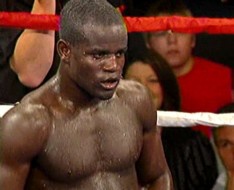
Joshua Clottey was standing beneath the world's largest television monitors when a disconcertingly buxom reporter asked sweetly: "May I try to punch you?"
I'm not sure Clottey quite understood, but she hit him anyway. It was a good, hard shot to the stomach. And again, for a second take. In those heels, the journalist from Azteca TV was almost half a foot taller, and looked to have the accommodating challenger substantially outweighed. Still, he took her best shots with great aplomb. Finally, the voluptuous correspondent declared that her hand was hurting.
If that seems an improbable exchange, consider what's forecast for Saturday night: a Filipino and an African will fight for one of the welterweight belts at Cowboys Stadium, with forty-five thousand expected to attend. So much for the long-held, widely alleged, and completely fictitious notion that boxing is dead.
Of course, by now most people -- including those who don't consider themselves fight fans -- are acquainted with Manny Pacquiao. He's won seven belts in seven weight classes, the last of which belonged to Miguel Cotto, whom he technically knocked out last November. Pacquiao is the consensus choice as the world's best fighter. He sings ballads on Jimmy Kimmel's show. A rock-star tour bus -- Pacquiao's image emblazed across the windows and side panels -- waits to take him and his considerable entourage from the Gaylord Texan resort to the stadium.
Less is known about his opponent, who made the same trek in a courtesy van. For the record, Clottey, 33, hails from Ghana and grew up in a one-room house. There were 10 people and one bed.
"We slept in shifts," says Clottey, who now lives with his girlfriend in a one-bedroom apartment just blocks from Yankee Stadium.
From his description, the Bronx is a promised land compared to his home town, the tough slum of Bokum. "The fighters always come from Bokum," says Clottey, who recalls learning to box with torn gloves and no handwraps in a concrete ring.
Then again, there's nothing unusual in that. Good fighters are forged from bad circumstances. Rather, Clottey's greatest pugilistic virtue was identified correctly by Miss Azteca. He takes a great punch.
He doesn't cut. He doesn't swell. He doesn't go down. In 15 years as a professional fighter, Clottey remains unmarked, but for a tattoo he got 13 days ago in Florida. The ornate crest -- his initials in an elaborate font with a pair of boxing gloves -- was needled into his right forearm for $300.
"I needed a logo," he explains, obviously planning for big things to come of Saturday night.
I remind him that Pacquiao's trainer, Freddie Roach, has predicted his fighter will be the first to earn a stoppage against Clottey.
"Why would Pacquiao knock me out?" he asks. "How can he do that? I don't feel my opponents' punches. I fought (Miguel) Cotto; I don't feel his punches. I fought Antonio Margarito, a big welterweight. I don't feel his punches."
It's worth noting that Clottey lost to both Cotto and Margarito, though you wouldn't have known it from the post-fight condition of their faces. Cotto, who won a split decision, was beat up and bleeding profusely, having suffered a horrible gash in the third round. Margarito, who owes his decision to Clottey's trying to fight with two fractured hands, was swollen and bruised.
"We saw (Margarito) in the hospital after the fight," recalls Clottey's manager, Vinny Scolpino. "His head was like twice the size of his normal head."
"Everybody I fight always looks worse," says Clottey, who considers himself blessed with "the mentality of the warrior."
It's a trait he believes indigenous to his fellow Ga tribesmen -- an example being the great featherweight champion Azumah Nelson. But it's especially apparent, he says, in those from Bokum, which has bred fighters like Ike Quartey, the fearsome welterweight who did his best work more than a decade ago. On his way up, Clottey did a good bit of sparring with Quartey. "That's where I learned how to defend," he says.
Clottey has a gift for blocking punches, for using raised forearms like a suit of armor, protecting his face and torso. I don't think that will work against Pacquiao, though. Pacquiao is fast afoot, able to move in and out of a bigger man's range. He's a southpaw who attacks on angles.
"He's just got to let his hands go," Scolpino says of his fighter. "He's too big and strong. If he lets his hands go, he'll hurt Pacquiao."
And if not, he'll be knocked out for sure.
With his longtime trainer still in Ghana, unable to obtain a visa, Clottey says he has a plan for Pacquiao. "He moves in and out, so I have to take my time," he says. "I have to be calm and cut off the ring."
I ask him how, and basically, he says he has to keep his left foot outside Pacquiao's right foot. That's how you fight a southpaw, but with Pacquiao's record in evidence, the feat is much easier planned than executed.
The second strategic component involves blocking Pacquiao's jab. The parry itself is not enough; he must step forward immediately after. He must keep pushing the naturally smaller man backward.
"I know who I am," he says. "I have trained the best for this fight. Maybe I will knock him out."
Again, I remind him of the trainer's prediction.
"I'm surprised Freddie Roach would say that."
In Clottey's thinking, the only explanation for a loss by knockout would be supernatural. "Some people have spirits that they worship, something that gives them power," he says. "We have that in Africa, but I don't do it."
Like what, I ask?
"Magic. Something I don't see."
"Magic?"
"It's not like he's going to knock me out with punches," says Joshua Clottey, dismissing Pacquiao's power as if it were full-figured and high-heeled.